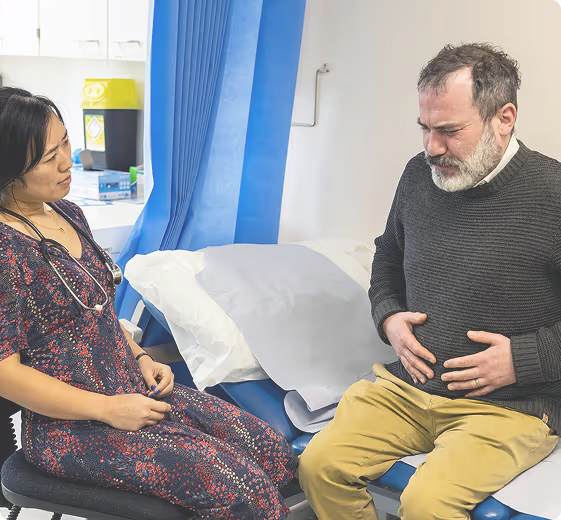Hernia Repair
Dr. Justin Greenslade’s practice offers a suite of advanced general surgical procedures tailored to your needs.

What is a hernia?
A hernia is a sac formed out of lining of an organ that comes through the hole or weak area in the wall of a muscle, tissue, or membrane that normally holds an organ in place. Hernias are more common in certain parts of the body such as the abdomen, groin and upper thigh area, and belly button area. They also can occur in any place where you have had an incision from surgery.
A hernia does not get better by itself and may need to be treated surgically as they have a high risk of becoming strangulated. A hernia repair is usually performed as an inpatient surgery with an overnight stay in the hospital. The operation may be performed as an “open” or “keyhole” (laparoscopic) surgery. In open hernia repair, a large incision is made on the groin or abdomen and the bulge is pushed back into place.
Dr Greenslade only accepts patients with private health insurance for hernia repair, except for hiatus hernia repair, in which case, he will accept self-funded patients.

Types of hernia
There are different types of hernia based on their location. The most common types are:
An inguinal hernia appears as a bulge in the groin or scrotum, occurring more commonly in men than women.
A hiatus hernia is when part of the stomach slides through the diaphragm, the muscular sheet that separates the lungs and chest from the abdomen.
A femoral hernia appears as a bulge in the upper thigh and is a loop of intestine, or another part of the abdominal contents, that has been forced out of the abdomen through a channel called the “femoral canal” (a tube-shaped passage at the top of the front of the thigh). This type of hernia tends to occur in older people and is more common in women than in men.
An umbilical hernia is a small bulge around the umbilicus (belly button). An umbilical hernia in an infant is caused by the incomplete closure of the muscles around the umbilicus.
An incisional hernia may be caused by the scar if you have had abdominal surgery.
Cost of hernia repair surgery
Dr Greenslade only accepts patients with private health insurance for hernia repair or patients who are covered by Veterans Affairs (DVA), except for hiatus hernia repair, in which case, he will accept self-funded patients.
If you have private health insurance, Dr Greenslade gap covers hernia repair surgery (ie. no out of pocket cost to you). The assistant surgeon will also gap cover. However, you will need to budget approximately $950 for the anaesthetist (the cost will vary depending on the anaesthetist and it may be less than this).
Once you have booked a surgery date, you will be provided with details of the anaesthetist to obtain an estimate of cost directly from them.
If you have a hiatus hernia and do not have private health insurance, the overall cost, including the hospital fees, surgeon, anaesthetist and assistant surgeon will be approximately $12,500.

Start your weight loss journey with Brisbane Bariatric Centre today
If you’re thinking about weight loss surgery or just want to know what’s possible, we’re here to help. Get in touch to book a chat with Dr Justin Greenslade and find out what’s right for you.


